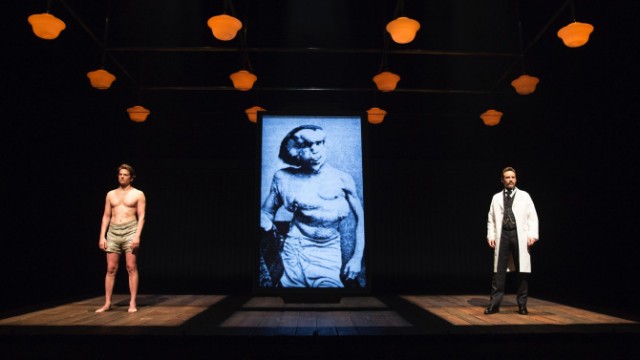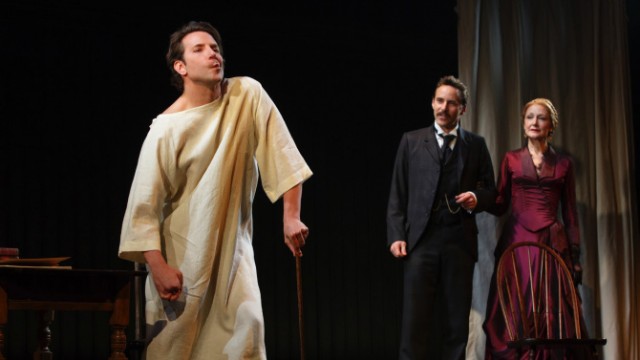
Bradley Cooper contorts himself into character as Dr. Frederick Treves (Alessandro Nivola) explains the physical deformations of the real John Merrick (photo by T. Charles Erickson)
Booth Theatre
222 West 45th St. between Broadway & Eighth Ave.
Through February 22, $79 – $169
www.elephantmanbroadway.com
www.shubert.nyc
The first time we see Bradley Cooper in director Scott Ellis’s strong revival of Bernard Pomerance’s 1977 Tony-winning hit, The Elephant Man, he is whole, perfectly formed, standing on the left side of the stage, wearing only a pair of shorts, a specimen on display for the audience. (There might be no applause at his initial appearance, but there is an audible gasp from appreciators of a fine male physique.) At stage right, Dr. Frederick Treves (Alessandro Nivola) is explaining the deformations that Cooper’s character, John Merrick, suffers from, pointing at enlarged photographs of the real Merrick, a nineteenth-century British resident of London. As Treves mentions each body part, Cooper contorts his shape, curling a hand, tightening a foot, twisting his mouth. Without makeup, he has turned himself into the sideshow spectacle known as the Elephant Man, and the transformation becomes complete when he speaks, grunts that soon flow into more eloquent language emerging from his misshapen mouth. In David Lynch’s 1980 film, an Oscar-nominated John Hurt played Merrick in full, disturbing makeup, but in the play Cooper — like such previous Merrick stage portrayers as the Tony-nominated Philip Anglim in the 1979 original, David Bowie as one of his replacements, and the Tony-nominated Billy Crudup in the 2002 Broadway revival — turns Merrick into a grotesque yet elegant and graceful character, a man whose inner beauty shines through as he goes from circus freak to a respected human being. But even as Merrick is accepted by high society, the medical community, and royalty, he still can’t escape being an attraction, eliciting a strange combination of revulsion and attraction, as Ellis (You Can’t Take It with You, The Mystery of Edwin Drood) cleverly uses the most basic theatricality to investigate what is revealed and what is hidden, changing scenes merely with curtains pulled across the stage by various minor characters.

Dr. Frederick Treves (Alessandro Nivola) and Mrs. Kendal (Patricia Clarkson) befriend John Merrick (Bradley Cooper) in powerful Broadway revival (photo by T. Charles Erickson)
Despite a few treacly moments of oversentimentality, Pomerance’s play is a profound exploration of what makes us all different — as well as what makes us very much the same. Two-time Oscar nominee Cooper (American Hustle, Silver Linings Playbook) is extraordinary as Merrick (whose real first name was Joseph), a severely disfigured man who just wants to be “normal.” Nivola (The Winslow Boy, A Month in the Country) is outstanding as Treves, a doctor who sees Merrick as more than just a difficult case, becoming a kind of proud yet seriously overprotective parent. And Patricia Clarkson (The House of Blue Leaves, Eastern Standard) is lovely and charming as the lovely and charming Mrs. Kendal, a popular actress who is more than a little intrigued by Merrick, ready to reveal herself in unexpected ways. The excellent cast also includes two-time Tony nominee Anthony Heald (Anything Goes, Love! Valour! Compassion!) as Bishop Walsham How, who wants to make sure that Merrick receives the proper religious education; Henry Stram (Inherit the Wind, Titanic) as hospital head Carr Gomm, who realizes that taking care of Merrick can be good for business; and Tony nominee Kathryn Meisle (Tartuffe, Outside Mullingar) as both Princess Alexandra, who takes an interest in the oddity that is the Elephant Man, and Miss Sandwich, a caretaker who is horrified by Merrick. Timothy R. Mackabee’s set is suitably spare, consisting of just a table at one time, a bathtub at another, matching Cooper’s courageous soul- and body-baring performance. Once upon a time, people flocked to see the Elephant Man for all the wrong reasons; now they are flocking to see The Elephant Man for all the right ones.